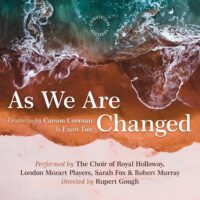Opus 1340
As We Are Changed (2019)
for Soprano, Tenor, SATB Chorus, and Chamber Orchestra
0.0.1(dbl. Bcl).0/0.1.1.0/pno/strings
Libretto by Euan Tait
- Part One: Collisions — Collisions
- Two souls on a far planet
- All the horses of the world vanish
- All of me
- Receiving his soul
- Lullaby
- What I was (1)
- The ignored
- What I was (2)
- Cradle song for a young adult
- Part Two: Song of My Music — My music began
- The creation of a life
- Birth
- Lion, lioness
- Creation of the world through birdsong
- Song for musicians
- Part Three: Songs of Transformation — No home
- A living music
- Soul seascape
- A human music
Duration: 65 min.
Dedication: for the Commonwealth Chorale in celebration of David Carrier’s 40th anniversary as artistic director, 2019–20
Commission: Commissioned by the Commonwealth Chorale
 Recorded on As We Are Changed (2021)
Recorded on As We Are Changed (2021)Publisher: Zimbel Press/Subito Music Corp.
Performance materials available from the publisher.
Vocal score and full score available for sale. Orchestral materials available on rental. Volume discount on vocal scores available with rental agreement. A PDF license duplication option for the vocal score is available by special arrangement.
As We Are Changed (2019), an oratorio for soprano, tenor, chorus, and chamber orchestra, was commissioned by and is dedicated to the Commonwealth Chorale (Boston, Massachusetts) in celebration of David Carrier’s 40th anniversary as artistic director. The music is by Carson Cooman to a libretto by Euan Tait.
Our world and our lives are transformational and in constant transformation, and this work is the music of those transformations. The earth we live on does not stay still but evolves and changes; our lives are changed through our own personal struggles, through meetings with those whose difference from us becomes a teacher, with sudden catalytic events, and from the daily, determined creativity of love working and spreading outwards from our humanity.
Part One: Collisions
The work begins with a great cry, worlds and lives in the process of creation and destruction; a creation and recreation myth, that everything is made from a great cry of anguish as much as a creative command. When human beings love, they are utterly changed, sometimes even broken by that love; loving another person means that we meet and are changed by their life story and their cry of pain—in the journey of a human relationship, human lives and ways of thinking and being are remade. The chorus sings for the great catalytic cries of all human beings, which are heard as far off yet powerful sounds, to which we are drawn in compassion—to answer and try to heal. Yet it is true that our pain can either become a source of compassion for others—or a cause of further bitterness and pain.
The two soloists represent two young souls lost from our shared lives, the ending of their life-journey ambiguous, mysterious, hinted at. They are both familiar people yet completely unknown—troubled, confusing to us, the mystery of people who fail to fit in and whose difference can stir anger, violence and prejudice in others. Yet their humanity is emerging into the new—the new planet a metaphor for their transformed existence. The soloists sing of their stories, and the movement ends with a tender song of remembrance: love’s determined, fierce, compassionate response to them.
Part Two: Song of My Music
The music becomes wild with rejoicing life and is the music of the creativity of our humanity, of our vividly living world, of seascapes, creatures, erupting into life through the gift of music, of the creation of human souls and the world through music.
Part Three: Songs of Transformation
The final part is the music of our personal and shared transformations. We stand on the edge of the new always, our lives a creative offering, constantly renewed in love, constantly open to where the cries of pain from our fellow human beings take us. Who is calling out to me? Where shall I meet you? Our encounters with music always change us, for music is a powerful creative force, and we are constantly struggling, yet also changed and transformed.
